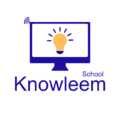Helping Special Learners
The learning needs of every student are different, and so is their learning pace. Some students catch certain fundamentals and topics better and faster than others. However, students who learn slower than others may also understand or perform better than their fast-learning peers and Knowleem School ensures that. It understands ways of helping slow learners and allows students to learn and assimilate at their own pace. There is complete freedom to delve deep into a concept or topic and understand the details.
Every learner has unique learning demands and a varied learning speed. Some pupils grasp fundamental concepts and subjects more quickly than others. However, students who learn more slowly than others may comprehend or do better than their faster-learning friends, and Knowleem School assures this. It understands how to support slow learners and allows them to study and integrate at their own speed. There is total flexibility to explore deeply into a notion or issue and grasp the nuances.
Several students become demotivated by monotonous and rigorous educational procedures, eventually losing interest in their studies. Parents can do nothing to assist their children in this area. Sending sluggish students to ‘Special Needs’ schools may or may not be an effective approach. To dispel the myth that slow learning equates to poor intelligence, Knowleem School, with its extremely inclusive approach to education, designed methods and lesson plans to help slow learners catch up with their peers.
We had a hurdle in developing a flexible learning program. However, the solution to slow learning required that we, as one of the top homeschools for slow learners, confront this difficulty straight on.
After years of research, we were able to create a study system that adjusts to the child’s learning demands rather than the other way around. Visuals and graphics enhance books, lectures, and tutorials, which can be slow to master. We are currently in the early stages of this project and would like to hear from both parents and children in order to develop strategies to improve our students’ learning.

